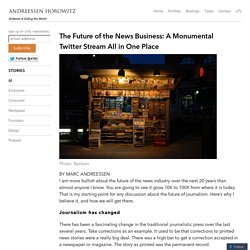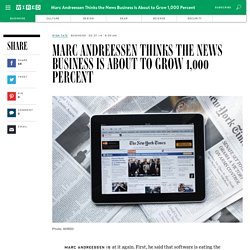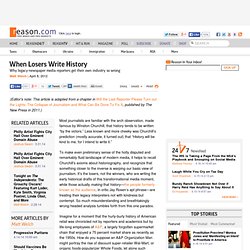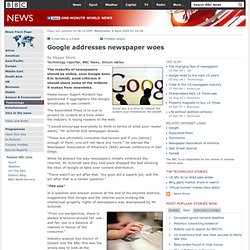

Vice News sparks debate on engaging younger viewers. The Future of the News Business: A Monumental Twitter Stream All in One Place. Photo: Benben BY MARC ANDREESSEN I am more bullish about the future of the news industry over the next 20 years than almost anyone I know.

You are going to see it grow 10X to 100X from where it is today. That is my starting point for any discussion about the future of journalism. Here’s why I believe it, and how we will get there. Journalism has changed There has been a fascinating change in the traditional journalistic press over the last several years. That was then. Now, even top print newspapers and magazines frequently revise stories online, sometimes dozens of times, often without tracking changes or acknowledging a change has been made. The glass-half-empty-view is that the quality bar for an initial post can be lower. For better or worse (and maybe both), print journalism is converging in technique and quality towards blogs and Wikipedia. But it may be that all journalism wins. Marc Andreessen Thinks the News Business Is About to Grow 1,000 Percent. Marc Andreessen is at it again.

First, he said that software is eating the world. Then, he told us the bitcoin digital currency will remake global finance. And now, the venture capitalist and founding father of the web browser says we’re on the verge of a major boom in the business of journalism, an internet-powered resurgence that will see the industry grow more than tenfold. Andressen isn’t the first investor to bet big on a new wave of original online content — either in this internet revolution or the last one — and few bets have actually panned out.
But there’s hard evidence that the boom he forecasts is already underway. For years, the internet undercut newspapers and other traditional news outlets. The very platforms that killed newspapers, he says, have amped up news consumption, creating more news readers (compared with broadcast systems used 30 years ago) and intensifying the habits of existing news consumers. Komt eraan! When Losers Write History. (Editor's note: This article is adapted from a chapter in Will the Last Reporter Please Turn out the Lights: The Collapse of Journalism and What Can Be Done To Fix It, published by The New Press in 2011.)

Most journalists are familiar with the arch observation, made famous by Winston Churchill, that history tends to be written “by the victors.” Less known and more cheeky was Churchill’s prediction (mostly accurate, it turned out) that “History will be kind to me, for I intend to write it.” To make even preliminary sense of the hotly disputed and remarkably fluid landscape of modern media, it helps to recall Churchill’s axioms about historiography, and recognize that something closer to the inverse is warping our basic view of journalism.
Every year, like a pack of crows announcing the arrival of winter, at least one and usually several anxious new tomes from big-media lifers pronounce journalism to be on death’s door. But what if the iron core isn’t shrinking?
Google addresses newspaper woes. The majority of newspapers should be online, says Google boss Eric Schmidt, amid criticism it should share some of the millions it makes from newslinks.

Media owner Rupert Murdoch has questioned if aggregators like Google should pay to use content. The Associated Press is to sue to protect its content at a time when the industry is losing readers to the web. "I would encourage everybody to think in terms of what your reader wants," Mr Schmidt told newspaper bosses. "These are ultimately consumer businesses and if you [annoy] enough of them, you will not have any more," he warned the Newspaper Association of America's (NAA) annual conference in San Diego.
While he praised the way newspapers initially embraced the internet, Mr Schmidt said they had since dropped the ball allowing the likes of Google to take over content distribution. "There wasn't an act after that. "Fair use" "What we should be focusing on is 'fair share'. " said Mr Doctor. "Parasites" Wait and see. HUmedia.nl. New tricks: 10 tips for Tweeting as your news organization.